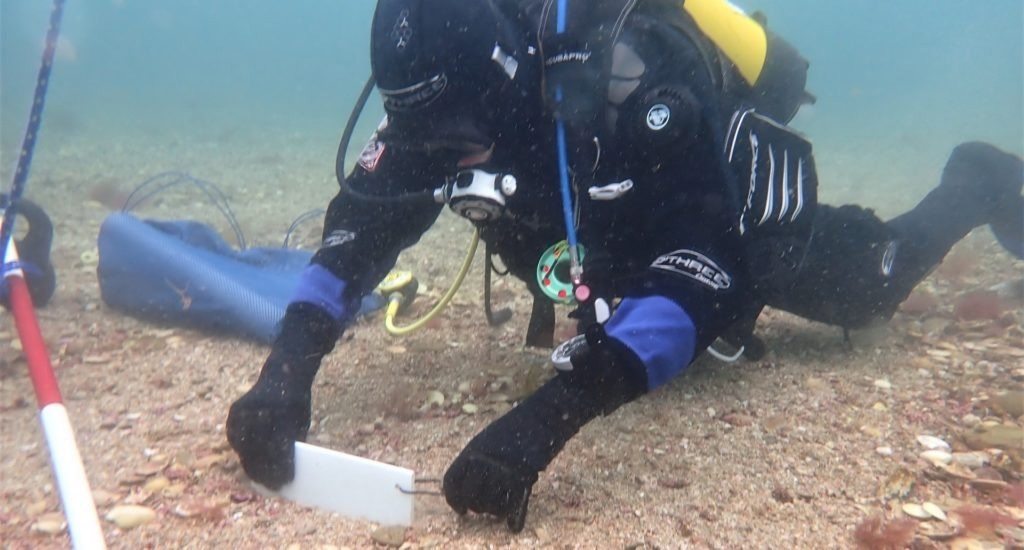Researchers working on a Cornwall Council initiative to investigate the potential of marine ecosystems in combating climate change identified one of the largest concentrations of a rare form of seaweed ever recorded in UK waters.
 Removing scrape samples. Image Credit: Matt Slater / Cornwall Wildlife Trust
Removing scrape samples. Image Credit: Matt Slater / Cornwall Wildlife Trust
The effectiveness of seagrass and seaweed in developing and storing “blue carbon” was assessed by the council through surveys conducted off the coast at Falmouth and Penzance by the University of Exeter and environmental researchers Natural Capital Solutions.
Scientists have found that the Fal and Helford Estuary Special Area of Conservation hosts a massive seabed of maerl, a rare and ancient seaweed, the size of approximately 900 rugby pitches. This discovery was made as part of the Blue Natural Capital Project.
The seafloor’s living environment, which is considered to be up to 4,000 years old, shields a variety of small marine creatures and plants.
At an estimated rate of 841 tons of CO2 per year, it is also incredibly effective at storing carbon, five times more than the catchment's total area absorbed by seagrass, kelp, and saltmarsh combined.
The region has now been identified as a major national site for this unique blue-carbon environment. This is the first time the whole expanse of the maerl beds and the organic matter stored in the protected area has been assessed.
Maerl has not been considered as a valuable carbon store to date, but our research demonstrates that as well as being a rare and valuable seabed habitat it should be a key player in coastal blue carbon assessments, which is an extremely important discovery for Cornwall where the extent of the maerl beds is significant.
Dr. Chris Laing, Study Lead and Senior Lecturer, Marine Biology, University of Exeter
The university, Falmouth Harbour Commissioners, Ocean Conservation Trust, and the council are collaborating to safeguard the priceless ecosystem from hazards, including nutrient discharge, swing moorings, anchor damage, and rising sea surface temperatures due to climate change.
I love being on the water around the Fal and am astounded to now discover the true extent and importance of the maerl beneath the waves. This invaluable research has increased our knowledge of this ancient seaweed and its ability to store large quantities of carbon for centuries to millennia, highlighting its importance as a natural solution in tackling climate change.
Martyn Alvey, Councillor and Council Member, Cornwall Council
Alvey added, “The project shows how these blue carbon habitats can help us in our response to both the climate and ecological emergencies if we properly protect them and allow them to fully recover. We are working with partners to ensure that these vital blue carbon ecosystems are protected from threats such as poor water quality, recreational boating and nutrient loading.”
In addition to maerl, additional ecosystems that are valued as blue carbon stores include seagrass, salt marsh, and kelp. With funding from Defra and the Environment Agency’s Natural Environment Investment Readiness Fund (NEIRF), the Blue Natural Capital Project has enhanced the knowledge of blue carbon in Cornwall by illuminating its characteristics and location, and establishing a baseline of evidence that will help secure future private funding for this natural resource.
The data gathered by the study will assist national blue carbon policy formulation and aid Cornwall Council and its partners steer the next phases of blue carbon research.
Building on the blue carbon work, research should focus on measuring a range of other benefits provided by maerl and other marine and coastal habitats, for example storm protection, recreation and water purification. Understanding how these benefits along with carbon change with habitat restoration is key to setting up blue natural capital markets in the future. In the meantime, local businesses, who have a stake in healthy marine and coastal systems, may want to invest directly in habitat restoration activities.
Alison Holt, Founder and Director, Natural Capital Solutions
Source: https://www.exeter.ac.uk/